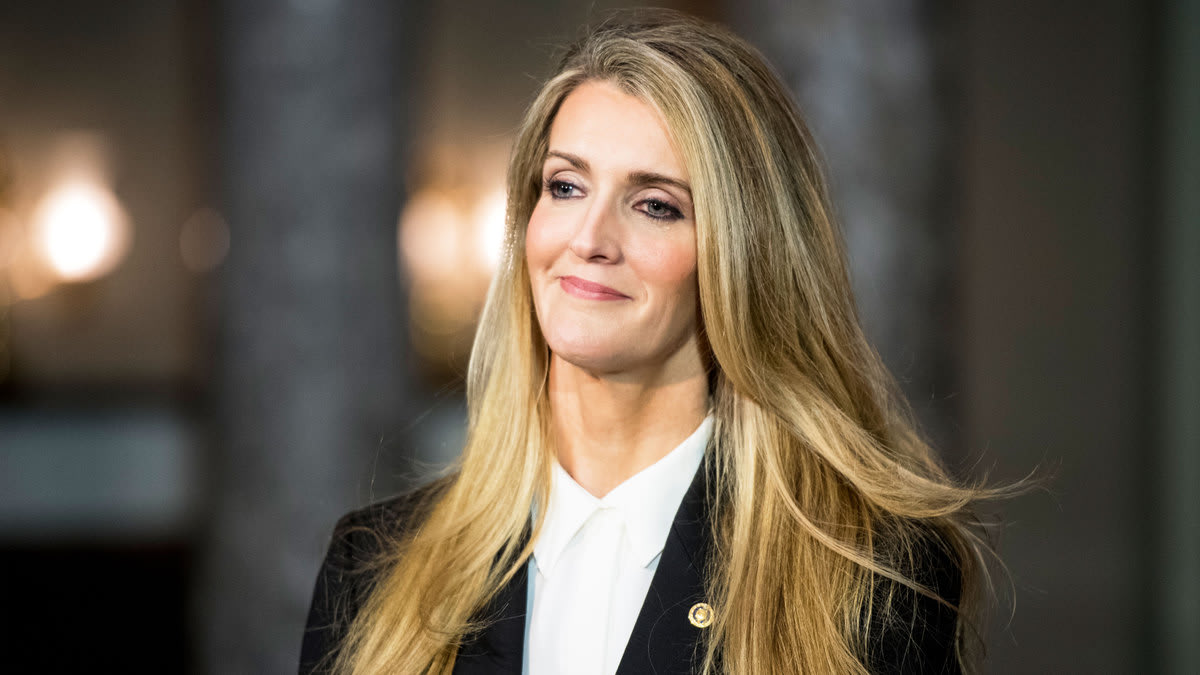Politically speaking, Senate Bill 945 was a perfect weapon for Sen. Kelly Loeffler (R-GA) in the midst of a hard-fought campaign.
The legislation, dubbed the Holding Foreign Companies Accountable Act, would require foreign companies listed on U.S. stock exchanges to regularly open up their books to auditors and U.S. investors—or else get booted from those exchanges. The clear target of the legislation was China, where companies invoke state security laws to avoid sharing potentially revealing information about the full scope of Beijing’s economic influence.
Loeffler, who came into office just months before the coronavirus hit the U.S. and inflamed anti-China sentiment in the GOP, quickly adopted hawkish views toward China as she competed for conservative votes against Rep. Doug Collins (R-GA) in Georgia’s crowded special election.
On the campaign trail this fall, the senator touted the legislation and reminded followers on social media, on multiple occasions, that she’d voted for it. During an October debate, she slammed Collins because the U.S. House hadn’t yet taken up the bill—going so far as to accuse her rival of “partnering with Nancy Pelosi to hold up holding China accountable.”
Loeffler ended up edging out Collins in that contest. The problem with her line of attack, however, is that the senator didn’t actually vote for the legislation. In May, the HFCA passed the Senate Banking Committee, of which she is not a member, and then it passed the Senate with unanimous consent—meaning it did not get a vote on the floor, with each senator on the record as a yes or no. She did not co-sponsor the bill, speak in favor of it on the Senate floor, put out a press release or even a single tweet on the legislation’s passage.
Meanwhile, Intercontinental Exchange—the company Loeffler’s husband runs, and which she is personally invested in—was concerned about the bill. Publicly, top company brass warned about its impact; privately, they dropped six-figure sums to lobby lawmakers on it.
That’s because Intercontinental Exchange runs a dozen stock markets around the world, including the New York Stock Exchange. Before being appointed to the Senate, Loeffler was an executive there, and her husband, Jeffrey Sprecher, is the CEO, chairman, and founder of the company. Loeffler personally retains up to $8 million worth of stock in the company, according to a September financial filing, and continues to make millions annually from those holdings.
To skeptics, the HFCA addresses a problem—a lack of transparency on the fiscal health of Chinese companies for U.S. investors—with an aggressive remedy. It would mandate that foreign companies listed on U.S. markets subject themselves to an accounting inspection once every three years by an independent board that reports its findings publicly. Companies that don’t agree would lose their listing on U.S. exchanges.
Analysts expect Chinese companies to leave, rather than subject themselves to stiffened U.S. oversight. With immensely valuable Chinese companies, such as Alibaba and Baidu, generating wealth and prestige for the NYSE, the prospect of their departure from the market would present a financial risk to Intercontinental Exchange.
That concern is reflected in federal lobbying records, which show that Intercontinental Exchange reported spending $350,000 in 2019 and 2020 pushing Congress on “listing restrictions” and the HFCA specifically. Those records do not reveal the exact nature of Intercontinental Exchange’s lobbying, or list whether the company was formally for or against the bill. But publicly, top officials at the NYSE made clear they were far from enthusiastic about the legislation.
A major reason why American markets are “so great and the envy of the world,” said NYSE vice chairman John Tuttle in July, “is because they are open to companies around the world to access capital, and available for investors to allocate capital as they see fit.” The bill’s intent might be good, said Tuttle, but its tactics could backfire. “We don’t necessarily agree with that,” he said.
Loeffler’s campaign did not respond to an inquiry regarding why the senator said she voted for the bill when she did not, why she did not co-sponsor the bill, and what role, if any, her family investment in Intercontinental Exchange played in her decision-making. Intercontinental Exchange did not respond to a request for comment.
Regardless, it remains the case that Loeffler has now touted a bill that, privately, a company at the heart of her and her husband’s fortune was deeply uneasy about. The situation adds nuance to the subject of U.S.-China relations, which Loeffler has worked to put in starkly black and white terms—both in her contest with Collins and now, as she faces Democrat Raphael Warnock in an all-important runoff election set for January.
“Members take great liberties with congressional legislation, depending on the needs of their campaigns,” said Darrell West, director of the governance studies program at the Brookings Institution think tank. “In this case, it looks like [Loeffler] is taking credit for a bill that passed unanimously. It all has to be read within the context of the campaign, and wanting to be tough on China. Today, everyone wants to be tough on China.”
When he announced he would appoint Loeffler to the seat vacated by retiring Sen. Johnny Isakson (R-GA) in December 2019, Gov. Brian Kemp invoked several key issues to tout the political newcomer’s appeal—immigration, abortion, guns, Trump. China was not among them.
But the GOP’s interest in China, and Loeffler’s, would dramatically increase after the outbreak of the coronavirus. In April, the Senate GOP’s official campaign arm sent out a detailed memo to candidates instructing them to blame China for the virus’s devastating impacts on the U.S., attack Democrats for being “soft” toward Beijing, and vow to impose penalties on China over the pandemic.
Loeffler, who had not spoken much about China before April, got the memo. In a May hearing in front of the Senate’s health panel, the senator used her time to rail against Beijing for a “cover-up” of vital information about the pandemic. When Trump himself became infected with COVID-19 in October, Loeffler tweeted that China would have to pay for giving him the virus. And the senator urged federal authorities to investigate possible election interference from China ahead of 2020, as the Trump administration emphasized possible threats coming from that country.
The HFCA became part of Loeffler’s China toolkit as the contest between herself and Collins for a Republican spot in the runoff reached a bitter conclusion. In an Oct. 12 tweet, Loeffler boasted that she “voted to delist companies with [Chinese Communist Party] ties,” but argued Collins didn’t support the measure. “Why is he covering for Communist China?” she asked.
In a tweet, Collins responded—“why haven’t you delisted these companies from your stock exchange?”—upping the ante with the hashtag, “#CCPKelly.”
But as the HFCA was working its way through Capitol Hill, Loeffler was far more circumspect about the bill. Between April and June, as Loeffler delivered blistering criticism of China’s handling of the COVID-19 pandemic and promoted her own bill meant to disentangle Chinese manufacturers from the U.S. supply chain, she did not have so much as a word on the HFCA. And she would cosponsor a host of China-related bills, including bills in May to enable new COVID-related sanctions on Beijing and to block U.S. government officials from using Chinese tech platforms, but not the HFCA.
On May 20, the HFCA was brought to the Senate floor to be passed by unanimous consent, which allows the chamber to bypass a roll call vote and approve a bill so long as no one objects. No one did, and the bill sailed through. Loeffler did not take to the Senate floor to praise it, or put out so much as a press release marking the passage of a bill that she would lord over her election opponent five months later.
But in Loeffler’s former world, and the world of her husband, the development was noted. Alibaba, the Chinese e-commerce giant, saw its share value on the NYSE drop by 1.5 percent on May 20, which analysts chalked up to the passage of the Senate bill.
Cosponsored by a bipartisan duo, Sens. Chris Van Hollen (D-MD) and John Kennedy (R-LA), HFCA gained steam amid recent examples of fraud from Chinese companies, notably Luckin Coffee. The company, China’s answer to Starbucks, splashed into the U.S. in 2019 with a $561 million initial public offering, but was later found to have relied on secretive accounting tricks to inflate its value. Of interest to China hawks in the bill, though, was the notion that exposing Chinese companies to auditing—done by a third-party nonprofit set up by Congress to conduct such work—would likely reveal the extent of big companies’ connections to the Chinese Communist Party.
The expectation among analysts was that many of those companies would choose to leave rather than subject themselves to scrutiny. And those departures will hurt the exchanges, said Jesse Fried, a professor at Harvard Law School who specializes in corporate and securities law.
Companies pay hefty yearly fees to be listed on exchanges like the NYSE. And the trading of shares and other financial products offered on exchanges commands fees, that while small, add up to a sizable take when considered collectively—especially for ICE’s NYSE, which processes $20 trillion worth of trades annually.
The delisting of companies, says Fried, will also dry up IPOs from China. “They make up a large percentage of IPOs, which are an important source of fresh blood and boost the prestige of the exchanges as well as their revenues.”
“It’s not surprising to me,” Fried added, “that they’d lobby heavily against the HFCA.”
On Monday, the House ended up passing the HFCA, unanimously, setting up Trump to sign it into law before he leaves office in January.
The lag between the Senate and House passage, noted Brookings’ West, is notable. “It may be that one chamber assumed the other would block it,” he said. “It also sounds like no one wanted to go on the record on this legislation, either someone in the House or Senate would have called for a roll call vote.”
“In this environment, everyone wants to be tough on China,” said West. “Nobody wanted to demand a roll call.”

